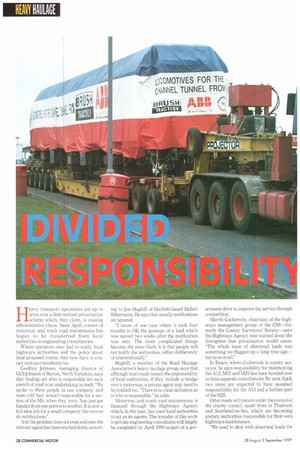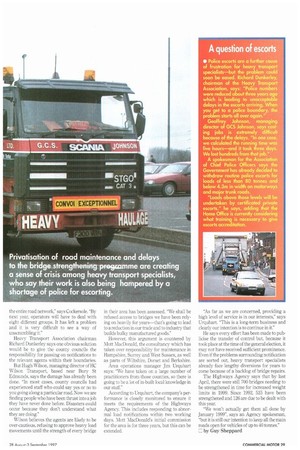H eavy transport specialists are up in arms over a little-noticed
Page 30

Page 31

If you've noticed an error in this article please click here to report it so we can fix it.
privatisation scheme which, they claim, is causing administrative chaos. Since April, control of motorway and truck road maintenance has begun to be transferred from local authorities to engineering consultancies.
Where operators once had to notify local highways authorities and the police about their proposed routes, they now have to contact various consultants too.
Geoffrey Johnson, managing director of GCS Johnson of Barton, North Yorkshire, says that finding out who is responsible for each stretch of mad is an undertaking in itself. "We spoke to three people in one company and were told they weren't responsible for a section of the M4, when they were. You just get handed from one person to another. It is now a full-time job for a small company like ours to do notifications."
And the problem does not even end once the relevant agent has been tracked down, accord. ing to Jon Hughill of Hatfield-based Hallett Silbermann. He says that usually notifications are ignored.
"I know of one case where it took four months to OK the passage of a load which was moved two weeks after the notification was sent. The more complicated things become, the more likely it is that people will not notify the authorities, either deliberately or unintentionally."
Hughill, a member of the Road Haulage Association's heavy haulage group, says that although local roads remain the responsibility of local authorities, if they include a bridge over a motorway, a private agent may need to be notified too. "There is no clear definition as to who is responsible." he adds.
Motorway and trunk road maintenance is financed through the Highways Agency which, in the past, has used local authorities to act as its agents. The transfer of this work to private engineering consultants will largely be completed by April 1999 as part of a goy
ernment drive to improve the service through competition.
Martin Cockersole, chairman of the highways management group of the CSS—formerly the County Surveyors' Society—says the Highways Agency was warned about the disruption that privatisation would cause. "The whole issue of abnormal loads was something we flagged up a long time ago— but to no avail."
In Essex, where Cockersole is county surveyor, he says responsibility for maintaining the Al2, M11 and M25 has been handed over to three separate consultancies. By next April, two more are expected to have assumed responsibility for the A13 and a further part of the M25.
Other roads will remain under the control of the county council, apart from in Thurrock and Southend-on-Sea, which are becoming unitary authorities responsible for their own highways maintenance.
"We used to deal with abnormal loads for the entire road network," says Cockersole. "By next year, operators will have to deal with eight different groups. It has left a problem and it is very difficult to see a way of unscrambling it."
Heavy Transport Association chairman Richard Dunkerley says one obvious solution would be to give the county councils the responsibility for passing on notifications to the relevant agents within their boundaries.
But Hugh Wilson, managing director of HC Wilson Transport, based near Bury St Edmunds, says the damage has already been done. "In most cases, county councils had experienced staff who could say yes or no to you going along a particular road. Now we are finding people who have been thrust into a job they have never done before. Disasters could occur because they don't understand what they are doing."
Wilson believes the agents are likely to be over-cautious, refusing to approve heavy load movements until the strength of every bridge in their area has been assessed. "We shall be refused access to bridges we have been relying on heavily for years—that's going to lead to a reduction in our trade and to industry that builds bulky manufactured goods."
However, this argument is countered by Mott MacDonald, the consultancy which has taken over responsibility for maintenance in Hampshire, Surrey and West Sussex, as well as parts of Wiltshire. Dorset and Berkshire.
Area operations manager Jim Urquhart says: "We have taken on a large number of practitioners from those counties, so there is going to be a lot of in-built local knowledge in our staff."
According to Urquhart, the company's performance is closely monitored to ensure it meets the requirements of the Highways Agency This includes responding to abnormal load notifications within two working days. Mott MacDonald's initial commission for the area is for three years, but this can be extended. "As far as we are concerned, providing a high level of service is in our interests," says Urquhart. "This is a long-term business and clearly our intention is to continue in it."
He says every effort has been made to publicise the transfer of control but, because it took place at the time of the general election, it may not have received sufficient prominence. Even if the problems surrounding notification are sorted out, heavy transport specialists already face lengthy diversions for years to come because of a backlog of bridge repairs.
The Highways Agency says that by last April, there were still 700 bridges needing to be strengthened in time for increased weight limits in 1999. Since 1992. 525 have been strengthened and 126 are due to be dealt with this year.
"We won't actually get them all done by January 1999", says an Agency spokesman, "but it is still our intention to keep all the main roads open for vehicles of up to 40 tonnes."
by Guy Sheppard
































































































